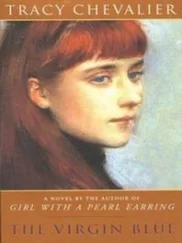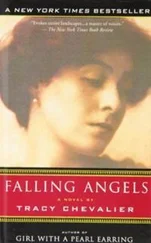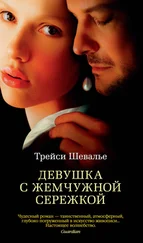“Wait a minute, now,” Billie Lapham protested, smoothing his moustache. He was a man full of twitches. “You planning to plant ’em somewhere else?”
What else would a man do with seedlings he’d dug up? Robert thought but kept to himself, smiling into the sack of cones.
“I can’t allow that,” Billie Lapham continued. “Oh, no! You’re stealing trees here to grow a grove to compete with this one. No, sir, I can’t allow that. Not at all.”
William Lobb grunted. “Even if I planted a grove a mile away, it would take a good five hundred years before it would look anything like this one. Your bones and my bones would be dust long before that. Anyway, you can rest assured these trees won’t compete with this grove: they’re going to England.”
Billie Lapham looked taken aback only for a second. “England! You plant redwoods there, nobody’ll come from there to see Cally Grove trees.”
To this ridiculous argument William Lobb did not bother with an answer. A fourth seedling landed in a pail, a little more roughly than the previous three.
“They’re sequoias,” Robert murmured.
“What?” Billie Lapham turned to Robert as if only just noticing him. “What did you say?”
“They’re not redwoods-they’re giant sequoias.” Robert found he enjoyed correcting Billie Lapham, even if he did not really know what he was saying.
“Of course they’re redwoods.” But William Lobb’s indifference to his authority had clearly shaken Billie Lapham’s confidence. “They got to be-the ads I’m running in the papers say they are.”
“An advertisement does not decide what a tree is called,” William Lobb said. “The California Academy of Sciences decided it is a different genus from redwoods and have named it a giant sequoia, with a Latin name to follow shortly. Redwoods are coastal, and tall and relatively thin, though still huge compared to other trees. Sequoias are in the foothills, and are wider and shorter.”
“Look here, now.” Billie Lapham cycled through all of his nervous tics, smoothing his moustache, then wiping his hands and brow. The gestures seemed to give him strength. “Are you planning to dig up more than them four pails? ’Cause I’m gonna have to charge you.”
William Lobb stopped digging and stabbed his spade into the ground, close enough to Billie Lapham’s feet to make him jump. “I’m done here,” he said to Robert. “When you’ve filled another sack, bring them over to the stables.” He pulled up the spade, took the four pails and hooked them over the handle. As he strode off, holding the spade horizontal so that the pails hung in a row, the seedlings bounced in time to his step.
Robert watched him go, aware that Billie Lapham had now turned towards him. It occurred to him that William Lobb had handed him his second job-negotiating with the owner of Calaveras Grove. Robert was not a negotiator, but if it meant working for Lobb, he would have to do it. From watching animals he had learned that he must not show weakness. And so, as Lobb had done, he did not look at Billie Lapham but continued to toss cones into the sack. At the same time, he considered the situation from the other’s point of view. Robert had never owned land, but he thought back to the Goodenough farm in the Black Swamp. If someone had come along and dug up apple seedlings on their property, and gathered seeds from windfalls, how would his father have responded? What would he have expected? A payment, at the very least. Robert tried to recall what John Chapman had charged for seedlings, so long ago. He thought it might have been five cents a seedling. Not that such figures really helped: California prices had been blown all out of proportion by the demands of the gold rush. When he was a boy back east, with a dollar fifty you could buy a whole barrel of hard cider. Here that amount would buy you one dinner in Sacramento. A pound of flour had been ten cents; now it was forty. Tobacco that cost six cents in New York was a dollar in California. But then, two years ago men were making a thousand dollars a month from gold, more than his father would have made in ten years.
It was impossible for Robert to place a value on trees; to him they stood apart from commerce. In pondering the price of a sequoia seedling, he recalled that John Appleseed himself-the consummate tree salesman-had been inconsistent about his prices. For no reason he had sometimes charged James Goodenough six cents a seedling rather than five, yet had also been known to give away bags of seeds.
It had been some time since Robert had thought about apple trees. He had not allowed himself to-when he did it made him feel sick and empty.
He did not want to value each sequoia cone or seedling. And he did not want to haggle. There must be another way. Robert looked up at Billie Lapham, who was once more mopping his brow, readying himself for the negotiation. Before he could touch his moustache as well, Robert said, “We’ll pay you five dollars for the seeds and seedlings we’re collecting from Calaveras Grove.”
Billie Lapham stroked his moustache. Clearly he didn’t know the value of the trees either. “All right,” he said, then seemed surprised at himself for agreeing. “Wait a minute-where would you collect ’em if I said no? There ain’t no giant redwoods-sequoias-anywhere else. Are there?”
“You’ve already agreed.” Robert stood and held out his hand. Billie Lapham hesitated, then took it. Obviously he was not much of a haggler either.

Robert spent the rest of the day collecting cones while William Lobb took more notes and sketched the trees. Lobb also gathered branches, needles and bark, carefully preserving their structure. “These I’ll dose in camphor and send to Kew to be studied,” he explained.
“‘Q,’” Robert repeated. “What’s that?”
“A botanical garden outside of London-the finest in the world. They collect and study all sorts of trees and plants. I always instruct Veitch to send them new discoveries. They’ll want to see the sequoias.”
Robert nodded, trying to imagine people interested enough in plants to study them. But then he thought of his father grafting the apple trees, how methodical he had been, and it didn’t seem so strange.
They camped just beyond Calaveras Grove rather than near the others-“so I don’t have to listen to braggarts all night,” William Lobb muttered. After they’d eaten and were sitting by the fire, Lobb smoking a pipe, Robert shyly asked if he could look at the leather notebook the Englishman had been using all day. When Lobb handed it over he held it to the firelight and leafed through the many notes and the drawings of the Calaveras Grove sequoias. Overviews Lobb had done of a whole tree, sitting several hundred feet away in order to see it from several angles. Drawings of the trunk, the bark, several different branches, the needles, the cones, the habitat under and around it. He had also sketched clumps of trees, and several sketches that could be put together into a panorama to give an idea of the size and scale of the whole grove. In some of the drawings Lobb had included a small figure standing next to the sequoia, wearing a hat similar to Robert’s own. He had never seen himself in a drawing, and though it was unsettling, he was pleased to be in William Lobb’s notebook. There were also sketches of the cones, as well as notes about their collecting: the date and location and elevation of where they had been picked up.
“What will you do with the seeds?” Robert asked, handing back the notebook.
“Send ’em to England.” Lobb stowed the notebook away. “The English will go crazy for these trees. They already love the redwoods I’ve sent back, and lots of the California pines. These sequoias will be the kings of many an estate in Bedfordshire or Staffordshire or Hertfordshire-if they survive.”
Читать дальше
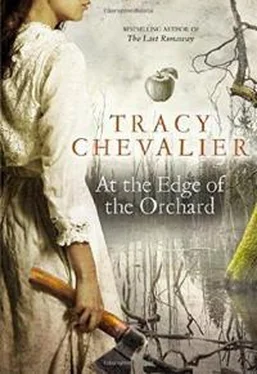


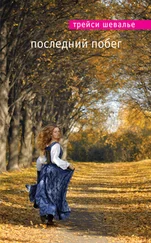

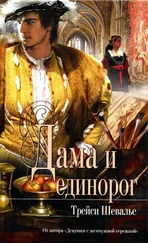

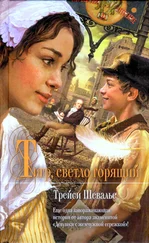
![Трейси Шевалье - Тонкая нить [Литрес]](/books/386177/trejsi-shevale-tonkaya-nit-litres-thumb.webp)
